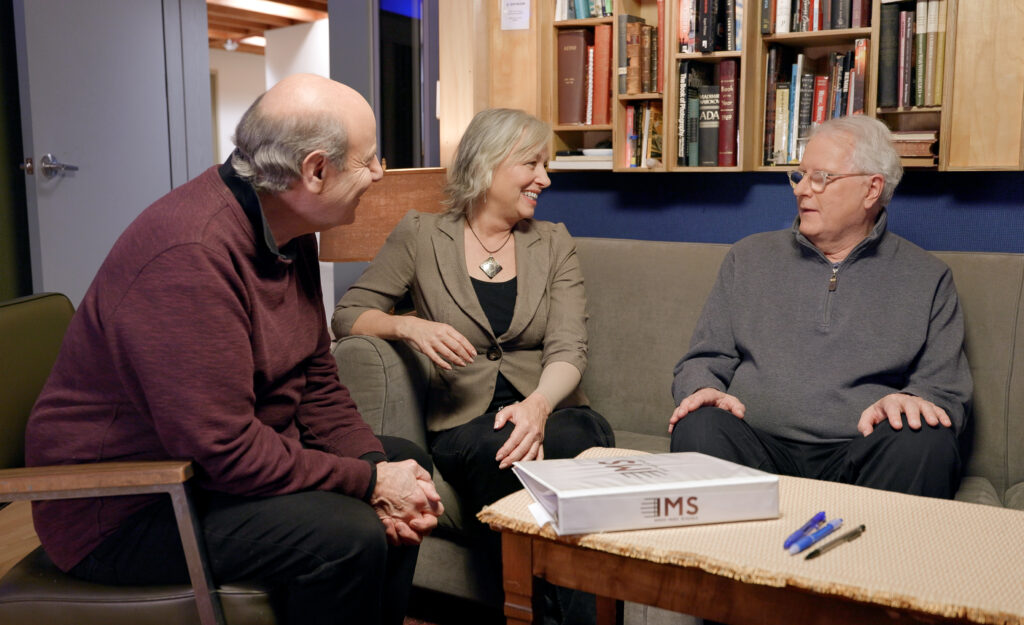For school counselors in public, academic high schools or performing arts-focused high schools, guiding students through college applications is already a complex process. But when it comes to music school admissions, the complexity multiplies — and even the most experienced counselors can feel like they’re in unfamiliar territory.
Unlike traditional college admissions, music programs have their own timelines, requirements, and expectations. For students with serious musical aspirations, successfully managing the process can make the difference between a favorable outcome and disappointment. For counselors, it raises the question: How do I support my students without going beyond my expertise?

This is where Inside Music Schools (IMS) steps in — providing a trusted, collaborative resource that helps counselors advise with confidence.
- Already have students navigating this process and need support right away? Learn more about our admissions consulting services.
- Need a few tips to get started? Keep reading to learn more about how our expertise and insight can complement your role, and then reach out when you’re ready.
Why Music School Admissions Are Different
At first glance, applying to a music school might look similar to applying anywhere else. But in reality, it’s a dual process: students must meet academic requirements for university programs and pass rigorous artistic evaluations.
- Conservatories focus almost entirely on music training, experience, and potential (with modest attention paid to academics.
- University music programs balance performance with academics.
- Liberal arts colleges with music majors prioritize well-rounded students who show strong academic achievement across disciplines, while still evaluating musical preparation and passion. These schools may not weigh auditions quite as heavily as conservatories or universities with dedicated music schools, but they look for evidence that music will play a meaningful role in a student’s college experience.
Each path has unique expectations — and each school their own process — from application deadlines to prescreening videos, to portfolio reviews, and audition requirements. Unlike standard applications, where grades and essays are the centerpiece, here the audition can take priority over the transcript.
Selecting the Right Music School Program
While a student may have a specific school in mind, other programs could be a better fit for them and should not be overlooked in the process of applying. It’s nearly impossible to offer students the best chance of acceptance without being overtly aware of the plethora of music schools and programs across the country. This makes it essential to have an expert in your corner who already has the experience, contacts, and knowledge to guide students toward the best programs for their skill sets and aspirations.
The Unique Timeline of Music School Applications
Music applications don’t always line up with traditional deadlines. In fact, many steps begin months earlier.
- Junior year: Students should already be preparing prescreening videos and composition or production/technology portfolio materials.
- Fall of senior year: Prescreens and portfolios are submitted (often by November 1 or December 1, can be earlier than standard college deadlines).
- Winter: Auditions and interviews take place — which must be scheduled and prepared well in advance.
For counselors balancing hundreds of students, these accelerated timelines can be easy to miss — and costly for students if overlooked.
Understanding the Application Components
Music school applications include elements unfamiliar to many counselors:
- Prescreening Videos: Video submissions featuring the students performing on their primary instrument, which determine if a student will even be invited to audition live.
- Auditions: Live or virtual performances, sometimes with sight-reading, ear training, or theory tests. Improvisation may be asked of some students.
- Repertoire requirements: Each school is likely to have different requirements, formats, or genres expected.
- Portfolio: Some majors require supplemental portfolios, including composition, production, songwriting, and technology.
- Artistic résumé: Beyond academics, students often need documentation of performances, ensembles, and private lessons.
These components can feel overwhelming to students and their families — and that’s where having the right resource can make all the difference.
Common Questions Counselors Hear (and How to Answer Them)
When a student or parent comes to you with questions, it’s not always easy to respond confidently. Here are a few you’ve likely heard:
- “Do I need perfect grades, or does talent matter more?”
→ Both matter, but the audition usually carries more weight in admissions decisions. - “How do I choose between a conservatory and a university music program?”
→ It depends on the student’s career goals and desired college experience. - “Do I need a résumé or portfolio if I’m a performer?”
→ Yes — documenting experience shows seriousness and preparation. - “What if I’m interested in multiple genres or careers in music?”
→ Programs differ widely in their flexibility; this is where expert guidance helps.
As a counselor, you don’t need to have every answer — you just need to connect students to the right experts: Inside Music Schools is your best solution.
How Counselors Can Best Support Aspiring Music Majors
Even without being a music admissions expert, you can make a huge difference in setting your students up for success. Here’s how:
- Encourage early preparation. The sooner students start preparing prescreens and auditions, the better.
- Connect students with resources. Private teachers, summer music programs, and audition coaching services like those at Inside Music Schools can strengthen applications.
- Help families stay realistic. A balanced list of schools is critical — not every student will, or should get into Juilliard, but there is a right fit for every student.
- Advocate for time management. Preparing for music admissions is almost like taking on an extra class.
How Inside Music Schools Can Help
This is where IMS comes in as your trusted partner. We don’t replace your role as counselor — we complement it.
Inside Music Schools provides:
- Individualized music admissions coaching for students.
- Audition coaching and portfolio prep with feedback from college-level faculty and professionals.
- Guidance on school fit based on career aspirations and skill assessments.
- Objective assessments of student readiness and next steps.
For you as a counselor, IMS is the referral partner that makes you look even more resourceful in the eyes of students and families. You don’t need to know everything about music admissions — you just need to know where to point your students.
Get a Collaborative Ally for Music College Admissions
As a school counselor, you already play a pivotal role in helping students find the right college path. But when it comes to music admissions, you don’t need to carry the weight alone.
With Inside Music Schools, you gain a collaborative ally who can step in with specialized expertise — allowing you to guide confidently, protect your credibility, and give your students the best possible chance at success.
Ready to Support Your Students with Confidence?
If you’d like to learn more about how Inside Music Schools can help your students — and make your role easier — we’d love to connect.
Contact Inside Music Schools to speak with Steve & Karen today. Let’s start a conversation about partnering to support your aspiring music majors.
Frequently Asked Questions About Music School Admissions
Most counselors have these same questions — and the answers are a good starting point. But they’re really just the tip of the iceberg. Music admissions has plenty of twists and turns, and that’s where working with a specialist like Inside Music Schools makes all the difference.
Do music schools care more about grades or auditions?
Conservatories mainly focus on musicianship skills and assessments gathered at the audition. However, an academic review will be part of the final decision if the music school is within a university. Auditions usually carry more weight than academics, but most schools still require a strong GPA and test scores (if applicable). Both matter, but the audition can determine admission more directly than grades alone.
When should students start preparing for music school applications?
Ideally, students should begin serious preparation by the end of sophomore year or beginning of junior year. Prescreens are due in the fall of senior year, which means repertoire and recordings need to be ready well in advance.
IMS has helped students as Freshmen, Sophomores, Juniors, and Seniors. We offer various tiers of service to accommodate budgets and the level of consulting each student and family needs.
What’s the difference between a conservatory and a university music program?
Conservatories focus almost exclusively on music training, while university programs balance performance with academics. Liberal arts colleges with music majors provide a broader college experience but fewer specialized resources.
From well-known schools and conservatories to lesser-known, but ideal programs for specific students, IMS has helped students gain acceptance into schools all across the US.
What are prescreens, and why are they important?
A prescreen is a recorded video audition submitted before live auditions. Many top schools require prescreens; only students who pass this stage are invited to audition in person.
This initial step in the review process is extremely important. We can help ensure you understand the requirements, select appropriate repertoire, assess your playing, and advise on best practices of creating and shooting prescreen videos that help you stand out. With the help of IMS, students and families can feel confident they’ve prepared stellar prescreening videos so they have the best chance to move to the next step – a live audition!
Can students apply to multiple types of music programs at once?
Yes, many students apply to a mix of conservatories, universities, and liberal arts colleges. Each school has unique requirements, so planning ahead is essential.
What happens if a student starts the process late?
It’s more challenging but still possible. IMS helps late starters identify realistic options, prepare quickly, and focus on schools with later deadlines or rolling auditions.
How can a counselor support students if they’re not familiar with music admissions?
Encourage early planning, keep families on track with timelines, and connect them with specialized resources like Inside Music Schools for auditions, prescreens, and school selection.
Does Inside Music Schools replace the role of a school counselor?
No — IMS complements the counselor’s role by handling the specialized aspects of music admissions while keeping the counselor in the loop.
Are there scholarships available for music majors?
Yes, many schools offer talent-based scholarships in addition to academic aid. IMS helps students understand where they may be most competitive for financial support.
Still have questions? Need more answers?
Every student’s path is unique, and we’re here to help you guide your students through each step of the music admissions process.
Schedule a call with Inside Music Schools to learn how we can work together for your students’ success.
Founder & President at Inside Music Schools | Insidemusicschools.com
Head of admissions and faculty member at Berklee College of Music for 40 years, Steve Lipman and our team at Inside Music Schools speak music as their primary language. We approach each client contact with open eyes, ears, and minds. As the country’s premier music school consultant, he has advised students from the United States, Canada, the U.K., India, Singapore, Dubai, China, Australia, Turkey, Colombia, Argentina, Brazil, Japan, Israel, Italy, Russia and elsewhere.

